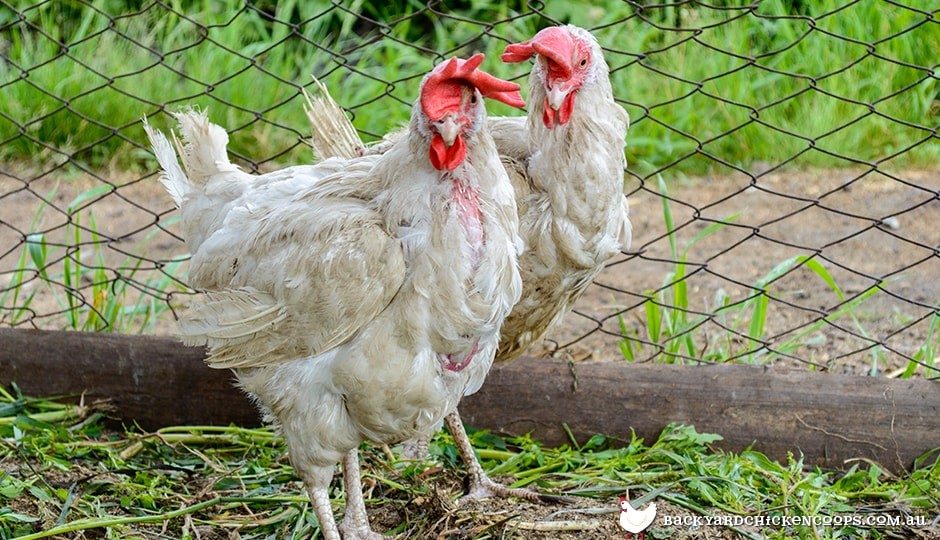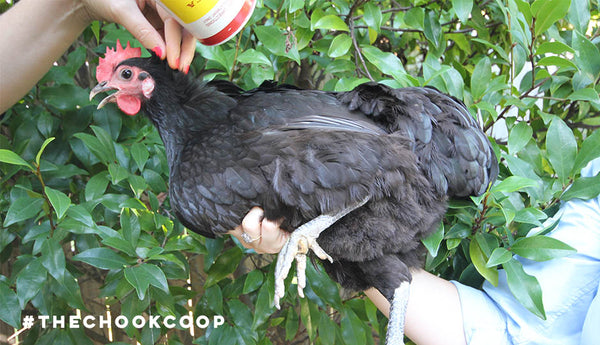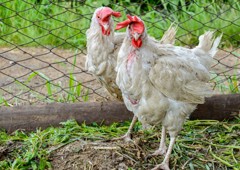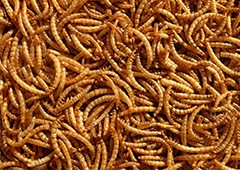Noticed your flock looking a little bare in the feather department, on their behind and other places (and it’s not moulting season?) Maybe they've got some red patches of skin showing here and there. Well, there are a few different causes as to why your chickens aren't looking as full feathered as usual.
Feather picking is a habit chickens can develop. It’s important to treat this behaviour as soon as you notice it, as once one chicken starts to peck feathers, the rest will probably follow suit!
Warning signs your chickens might be feather picking:
-
Red, irritated patches of bald skin (often near the tail)
-
Loss of feathers
-
Possibly some presence of blood on the skin
What to do:
Feather picking can be caused by a number of different factors, each with their own remedies. It is very important to stop this behaviour, as it can become contagious within the flock - the sight of red skin can sometimes provoke other chickens to start pecking!
If your chickens look as though their beaks have been busy, try some of these different tactics, and see if the feather picking problem disappears.
-
Diet changes:
Increase the protein in their diet - sometimes hens pick at their own feathers because they are lacking in protein. Make sure your flock’s getting enough feed - maybe add the occasional bit of yoghurt into their diet. Also, maybe incorporate some shell grit into their diet, if you haven’t already.
-
Boredom busters:
Ensure your chickens aren’t bored. Sometimes, restless chickens will do anything to keep themselves amused - pecking at their own feathers, and each others. This can also cause other bad habits such as egg eating, so it’s important to give your chickens something to do! Try some of these Boredom Busters For Your Chickens to keep bad behaviour at bay.
-
Cramped quarters:
If your chickens house is a bit small and your feathered friends are overcrowded, this may cause your chooks to become restless and peck at each other. Therefore having ample room for everyone to roam in is important. Check out our Taj Mahal, Penthouse and Mansion coops if you’re in need of a size upgrade, or a new house for the flock.
A parasite problem
Parasites like lice and mites can cause irritation and a loss of feathers, if left untreated.
Warning signs your chickens might have parasites include:
-
Droopy, listless behaviour
-
Irritated skin
-
Loss of feathers
-
A presence of lice or mites on their skin on closer inspection (they often look like small black, red or ‘mustard colour’ dots)
What to do:
Give the chicken coop a good spring cleaning, and dust with diatomaceous earth. Dust the chickens with diatomaceous earth or pestene.
Your girls have gone broody
Noticed your hens are a bit on the moody side? Hens who have gone broody sometimes pluck out their own feathers to make a comfortable nest for their little ones.
Signs your hens may have gone broody:
-
Puffing up their feathers/acting aggressive when you come towards them
-
A decrease in their appetite
-
Feathers in the nesting box
If your hen has gone broody and you have no intention of using her to hatch eggs, then it’s important to break the broody behaviour. This is because hens often neglect their own needs when they go broody, which can cause serious detriment to their health if they’re left broody for too long. Check out our How To Break Broody Behaviour article for more information.
If your hen is looking a little bare, then it might be an indication that her health isn’t as tip top as it should be. Observe the flock’s behaviour, make a few small changes to their diet and environment and see if the feathers grow back. If your chickens have lost feathers and are exhibiting some other serious behavioural problems such as loss of appetite, lethargy and/or walking strangely, don’t hesitate to call a vet for a professional opinion.
There are lots of things to look out for when it comes to health-related issues in your flock. It can be stressful and worrying when things aren't going well. We all want to do an eggcellent job when caring for our feathered friends. From herbal treatments to disease prevention, make sure that you've got the knowledge you need to raise happy, healthy chooks. Did you know 67% of chicken keepers surveyed experienced a chicken health or behaviour issue in the first 12 months that they didn’t know how to handle?
But don’t worry! Our feathered friends over at Chickenpedia have created a Chicken Healthcare Course. It is a comprehensive online course that covers everything you need, including what to look for in an unhealthy chicken and how to support your egg-laying hens to optimal health. All of their courses are really well structured and filled with vital information, which is why I highly recommend them to all of my readers! From raising baby chicks to feeding to behavior, you’ll find valuable information that’ll give you the knowledge and confidence to successfully look after your chickens.
Check out Chickenpedia today. As a member, you will also get access to the ALL of their chicken courses!


















